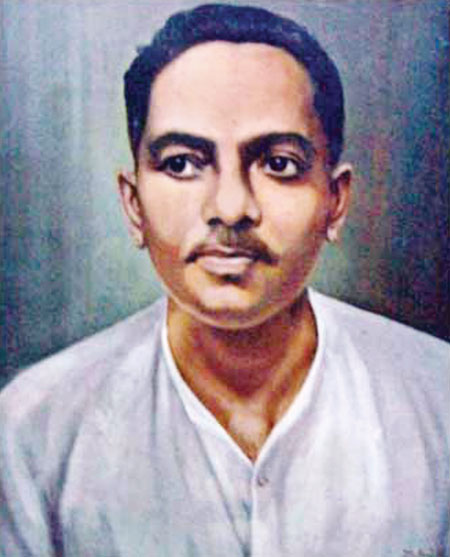
Literature Desk :
Jibanananda Das was a great poet, writer, novelist and essayist. He took on the modernist project, reinvigorated the poetic diction. He emancipated Bengali poetry from the influence of Rabindranath Tagore and expanded the reach of Bengali poetry. His poems are regarded as the part of the Bengali consciousness in India and Bangladesh.
Das wrote ceaselessly but as he was an introvert and the “most alone of (Bengali) poets”, he “compelled to suppress some of his most important writings or to locate them in a secret life”. During his lifetime, only seven volumes of his poems were published. After his death, it was discovered that apart from poems Das wrote several novels and a large number of short stories. His unpublished works are still being published. Das died on October 22, 1954; eight days after he was hit by a tramcar. The witnesses said that though the tramcar whistled, he did not stop and got struck. Some deem the accident as an attempt of suicide.
Jibanananda Das was born on February 17 in 1899 in the small district town of Barisal, in the south of Bangladesh. His ancestors came from the Bikrampur region of Dhaka district, from a now-extinct village called Gaupara on the banks of the river Padma. Jibanananda’s grandfather Sarbananda Dasgupta was the first to settle permanently in Barisal. He was an early exponent of the reformist Brahmo Samaj movement in Barisal and was highly regarded in town for his philanthropy. He erased the gupta suffix from the family name, regarding it as a symbol of Vedic Brahmin excess, thus rendering the sumame to Das.
Jibanananda’s father Satyananda Das (1863-1942) was a schoolmaster, essayist, magazine publisher, and founder-editor of Brohmobad, a journal of the Brahmo Samaj dedicated to the exploration of social issues. Jibanananda’s mother Kusumkumari Das was a poet who wrote a famous poem called Adorsho Chhele (The IdeaJ Boy’) whose refrain is well known to Bengalis to this day:
“Amader deshe hobe shei chhele kobe/Kothay na boro hoye kaje boro hobe”. (‘The child who achieves not in words but in deeds, when will this land know such one?) Jibanananda was the eldest son of his parents, and was called by the nickname Milu. A younger brother Ashokananda Das was born in 1908 and a sister called Shuchorita in 1915. Milu fell violently ill in his childhood, and his parents feared for his life. Fervently in desiring to restore his health, Kusumkumari took her ailing child on pilgrimage to Lucknow, Agra and Giridih. They were accompanied on these journey’ by their uncle Chandranath. In January 1908, Milu, by now eight years old, was admitted to the fifth grade in Brojomohon School. The delay was due to his father’s opposition to admitting children into school at too early an age. Milu’s childhood education was therefore limited to his mother’s tutelage.
His school life passed by relatively uneventfully. In 1915 he successfully completed his Matriculation examination from Brojomohon, obtaining a first division in the process. He repeated the feat two years later when he passed the Intermediate exams from Brajamohan College. Evidently an accomplished student, he left his rural Barisal to join the University of Calcutta.
Bengali is the mother tongue of more than 320 million people living mainly in Bangladesh and India. Bengali poetry of the modern age flourished on the elaborate foundation laid by Michael Madhusudan Dutt (1824-1873), Rabindranath Tagore (1861-1941) and Kazi Nazrul Islam (1899-1976). Tagore, a literary giant unparalleled in his time, ruled over the domain of Bengali poetry and literature for more than half a century, inescapably influencing contemporary poets.
In Bengal, efforts to break out of the Tagorian worldview and stylistics started in the early days of the 20th century. Poet Kazi Nazrul Islam popularised himself on a wide scale with patriotic themes and musical tone and tenor. However, a number of poets consciously attempted to align Bengali poetry with the essence of worldwide emergent modernism, starting towards the end of the 19th century and attributable to contemporary European and American trends. Five poets who are particularly acclaimed for their contribution in creating a post Tagorian poetic paradigm and infusing modernism in Bengali poetry are Sudhindranath Dutta (1901-1960), Buddhadeb Bose (1908-1974), Amiya Chakravarty (1901-1986), Jibanananda Das (18991954) and Bishnu Dey (1909-1982). The contour of modernism in 20th-eentury Bengali poetry was drawn by these five pioneers and some of their contemporaries. However, not all of them have survived the test of time. Of them, poet Jibanananda Das was little understood during his lifetime. In fact, he received scanty attention and some considered him incomprehensible. Readers, including his contemporary literary critics, also alleged faults in his style and diction. On occasions, he faced merciless criticism from leading literary personalities of his time. Even Rabindranath Tagore made unkind remarks on his diction, although he praised his poetic capability. Evertheless, destiny reserved a crown for him.
On October 14, 1954, he was carelessly crossing a road near Calcutta’s Deshapriya Park when he was hit by a tram. Jibanananda was returning home after his routine evening walk. At that time, he used to reside in a rented apartment on the Lansdowne Road. Seriously injured, he was taken to Shambhunath Pundit Hospital. Poet-writer Sajanikama Das who had been one of his fiercest critics was tireless in his efforts to secure the best treatment for the poet. He even persuaded Dr Bidhan Chandra Roy (then Chief Minister of West Bengal) to visit him in hospital. Nonetheless, the injury was too severe to redress. Jibailananda died in hospital on October 22, 1954 eight days later, at about midnight. He was then 55 and left behind his wife, Labanyaprabha Das, a son and a daughter, and the ever-growing band of readers.
His body was cremated the following day at Keoratola crematorium. Following popular belief, it has been alleged in some biographical accounts that his accident was actually an attempt at suicide. n

